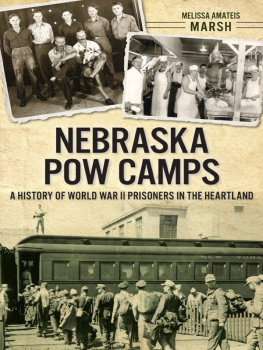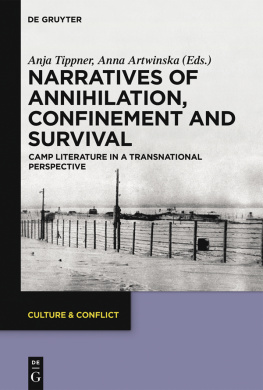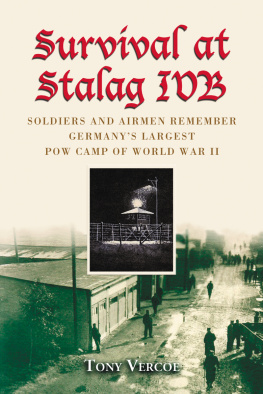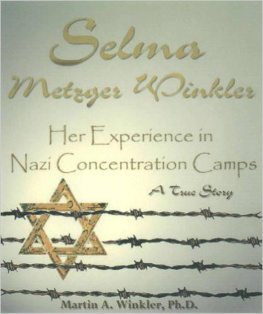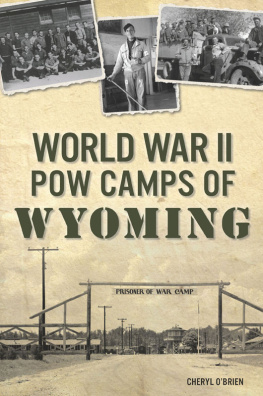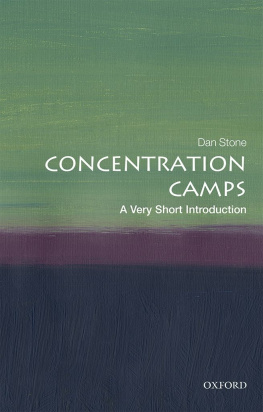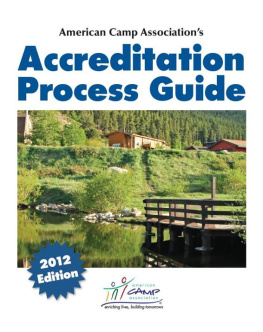

Published by The History Press
Charleston, SC 29403
www.historypress.net
Copyright 2014 by Melissa Amateis Marsh
All rights reserved
First published 2014
e-book edition 2014
ISBN 978.1.62584.955.7
Library of Congress Cataloging-in-Publication Data
Marsh, Melissa Amateis.
Nebraska POW camps : a history of World War II prisoners in the heartland / Melissa Amateis Marsh.
pages cm
Includes bibliographical references and index.
print edition ISBN 978-1-62619-419-9
1. World War, 1939-1945--Prisoners and prisons, American. 2. World War, 1939-1945--Nebraska. 3. Prisoners of war--United States--History--20th century. 4. Prisoners of war--Germany--History--20th century. 5. Nebraska--History, Military. I. Title.
D805.U5M37 2014
940.54727309782--dc23
2014009996
Notice: The information in this book is true and complete to the best of our knowledge. It is offered without guarantee on the part of the author or The History Press. The author and The History Press disclaim all liability in connection with the use of this book.
All rights reserved. No part of this book may be reproduced or transmitted in any form whatsoever without prior written permission from the publisher except in the case of brief quotations embodied in critical articles and reviews.
Dedicated to those who preserve the past.
CONTENTS
PREFACE
Telling the story of Nebraskas World War II POW camps isnt an easy one. Information for some camps is plentiful, while others are scarce, leaving several gaping holes in the historical record. This is one of the hazards of trying to resurrect the pasttoo many others were not concerned with preserving the past. Files were misplaced, accidentally lost or purposely destroyed. Some camps hardly rated a mention in the town newspaper while other local journalists meticulously recorded the activities at the camp in their community. Each camps story, therefore, is unique.
Youll notice that I have taken a somewhat unorthodox approach in telling the history of these camps. Nebraska POW Camps is neither a scholarly study nor a general history but a mixture of both. I took this route not only because of the scarcity of historical records but also because I tend to have one foot planted in the academic world while the other is firmly in the general, or popular, world of history. Thus, the book is tailored to both audiences.
Though I would dearly love to treat each camps story equally, the historical record makes this impossible. Instead, for this book, I focus chiefly on the three base camps of NebraskaFort Robinson, Camp Scottsbluff and Camp Atlantaand then I offer a brief profile on each branch camp. Where possible, I have included anecdotes along with the historical record, though I could not include all due to space reasons.
I hope you will enjoy this look into a time of Nebraskas World War II history that has largely been lost.
ACKNOWLEDGEMENTS
First and foremost: I thank God for giving me the guidance, wisdom and strength to tackle this project.
There are many people to thank, both personally and professionally, for their help and support. For research assistance: Tom Buecker, Sandra Slater, Katie Bradshaw, Allison Young, Bill Baumbach and all those who I spoke with or received letters from reminiscing about their experiences. For graphics and photo help: Katie Nieland, Dave Frank, Jason Ortiz and Randy Bright. For my family both near and far, who have always loved me unconditionally and supported my passion for history: thank you for always being there.
Id especially like to thank my husband and my daughter for putting up with my long hours at the computer and my vacant gazes when Im lost in thought and for allowing paperwork and books to clutter nearly every room in the house.
And of course, I couldnt have done it without my three research assistants, aka the cats: Kathryn, LuLu and Slick.
INTRODUCTION
Every summer morning in the early 1940s, Lois Neeleys mother would head to the strawberry patch on their family farm five miles northeast of Scottsbluff, Nebraska. There she met her neighbor, and the two women would fill their pails with strawberries. Loiss mother put those strawberries to good use. Though she froze most of them, she made plenty of strawberry jam, strawberry pie and even strawberry ice cream. For her, there was never too much of strawberry anything. After her foray into the strawberry patch, she would make a large sheet cake perfect for strawberry shortcake.
And one day, she used six servings of strawberry shortcake to break the rules.
There were strict rules the farmer had to follow when using POWs, Lois remembers. Her father needed help to build a large shed to store winter farm implements. He asked for permission to use POW labor from the nearby POW camp in Scottsbluff. The minimum number of POWs they could have was six, and thats how many he picked up from the camp at 6:00 a.m. Loiss father loaded them into the back of his pickup and headed for the farm. No guard accompanied them.
But there were still procedures to followimportant ones. After all, this was the enemy. They were not to be given any food, Lois recalls, [and you could] never allow them in your yard to sit on the grass and above all, never invite them into your home. Loiss father talked to other area farmers, who assured him that no camp guards came out and checked to make sure those rules were being followed. He planned to follow them from the get-go. Except

This map shows the locations of POW camps in Nebraska during World War II. Map designed by Katie Nieland.
Each prisoner was given a sack lunch for their noon meal, which consisted of one or two slices of stale dry bread, one slice of stale lunchmeat and a thermos of strong black coffee, Lois said. After all, they were prisoners and had to be treated like prisoners. Bread, lunchmeat and coffee were a little bit better than the standard fare of bread and water, but surely it didnt satisfy these mens appetites.
So Loiss parents made a decision. We had a large fenced-in yard with lots of grass and shade trees, Lois said. Dad let the prisoners sit on the grass to eat their sack lunches. That was one rule violated. But Loiss parents didnt stop there. Since the rumors were apparently true and no guard made a surprise inspection, Loiss father went a step further. He invited the POWs inside the house.
Of course, they saved the best rule break for last.
After dinner, Mom put slices of cake on six dinner plates, heaped them with strawberries and lots of whipped cream, and we took them to the prisoners, Lois remembers. They all really enjoyed it and ate it every day they worked for us. It should come as little surprise, then, that they also ate dinner at the table with the family for the rest of their time on the farm, too.

Many Americans would probably be astonished to learn that roughly 400,000 German, 51,000 Italian and 5,000 Japanese prisoners of war were held in the United States of America during World War II. The Axis POWs received exemplary treatment, so much so that they wrote to relatives in Germany begging them not to send any food but to keep it for themselves.
Next page
